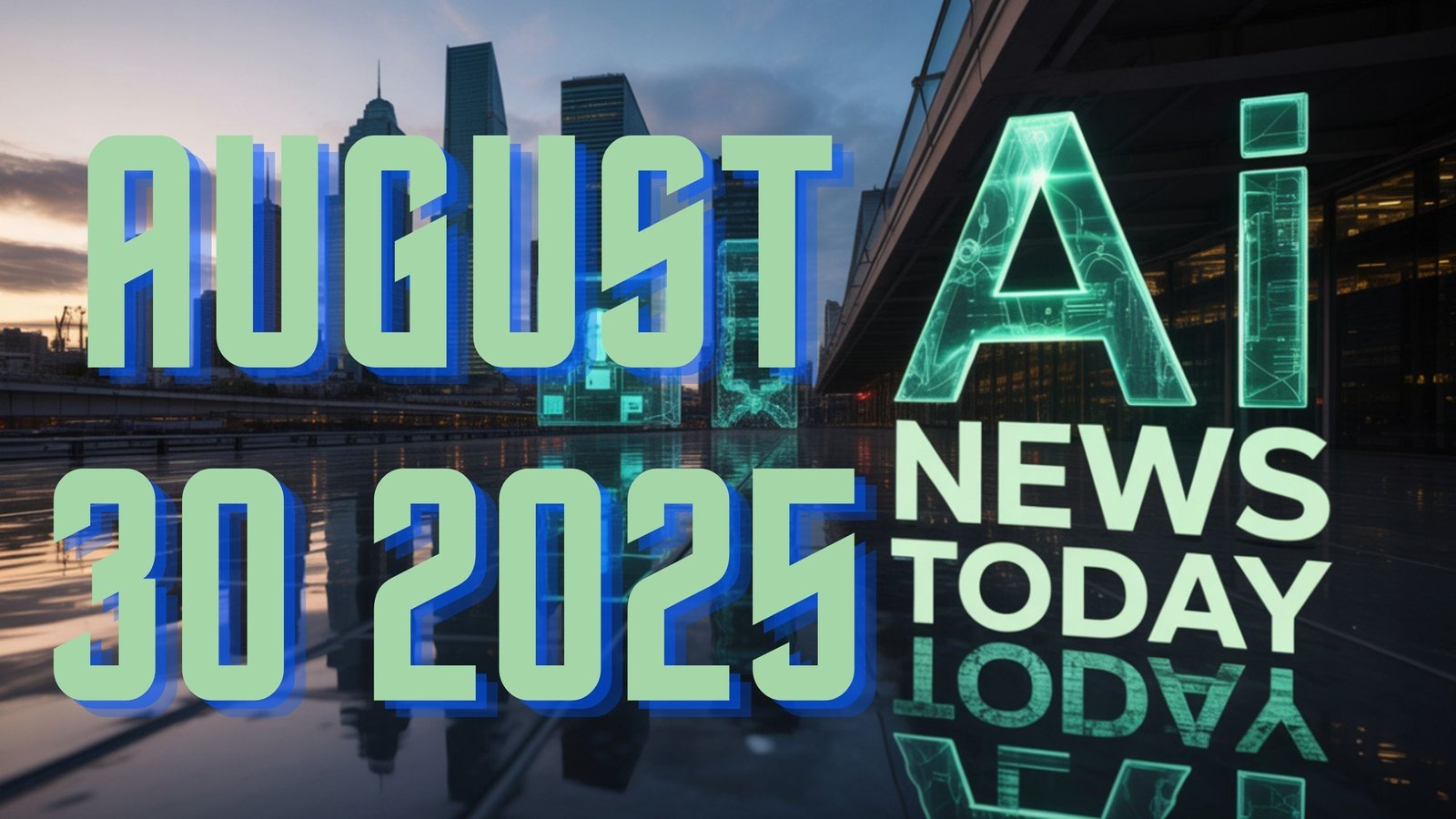AI News Daily — USA (Saturday, August 30, 2025): The global AI landscape is dramatically transforming, marked by sweeping changes from the world’s most prominent tech players. Meta has announced a significant restructuring of its Superintelligence Labs, with CEO Mark Zuckerberg and newly appointed AI chief Alexandr Wang splitting the division into four specialized teams to accelerate progress toward personal superintelligence. Meanwhile, Microsoft is signaling independence from OpenAI with the launch of its first proprietary AI models, MAI-Voice-1 and MAI-1 Preview, underscoring its push for an in-house AI stack. Nvidia’s CEO Jensen Huang, predicting a four-day workweek, insists AI will make people busier, not idle. At the same time, sectors from child online safety to medical imaging are seeing groundbreaking AI innovations.
Meta’s “Superintelligence Labs” Restructure Marks a New Era in AI Development
Meta has announced one of its most significant organizational transformations in artificial intelligence. Under the leadership of CEO Mark Zuckerberg and newly appointed AI chief Alexandr Wang, the company is restructuring its Meta Superintelligence Labs (MSL) into four distinct divisions, each designed to accelerate innovation and move closer to the company’s bold vision of achieving personal superintelligence. This strategic reorganization shocks the tech industry and reshapes the competitive race toward artificial general intelligence (AGI).
Meta’s Superintelligence Labs: A Major Overhaul
The restructuring dissolves the previously standalone AGI Foundations group, redistributing its experts across new specialized teams. The four divisions announced are:
- TBD Lab – Dedicated to experimental, forward-looking AI initiatives and long-term research.
- FAIR (Fundamental AI Research) – Continuing Meta’s tradition of academic-level AI exploration, advancing theoretical breakthroughs.
- Products & Applied Research – Driving product-focused AI applications, ensuring that research translates into consumer-ready innovations.
- MSL Infra – Concentrating on the infrastructure, computing, and scalability required to train next-generation AI systems.
By consolidating nearly all of Meta’s AI leadership under Alexandr Wang, including high-profile figures like Nat Friedman (former GitHub CEO) and Aparna Ramani (a veteran engineering leader), the company is emphasizing centralization and speed. Zuckerberg and Wang’s approach suggests that Meta aims to remove silos, accelerate experimentation, and bring AI products to market faster.
Meta’s Push Toward “Personal Superintelligence”
The ultimate objective behind the overhaul is to position Meta at the forefront of personal superintelligence—a form of AI capable of surpassing human intellectual abilities while remaining accessible to individuals. This aligns with Zuckerberg’s vision of AI assistants integrated across Meta’s ecosystem, from WhatsApp to Instagram to Meta Quest devices.
By merging foundational research with applied product development, Meta hopes to shorten the timeline toward AGI breakthroughs, keeping pace with industry competitors such as OpenAI, Anthropic, and Google DeepMind. The restructuring also reflects industry-wide shifts, where speed and scalability now outweigh traditional research silos.
Microsoft’s Proprietary AI Models: A Strategic Shift
While Meta centralizes its AI units, Microsoft signals independence in its AI journey. The company unveiled MAI-Voice-1 and MAI-1 Preview, its first proprietary AI models designed in-house.
- MAI-Voice-1: A cutting-edge speech generation model that produces instantaneous, natural audio content. Its applications range from AI assistants to multilingual customer support and real-time content creation.
- MAI-1 Preview: A foundational large language model (LLM) released for public testing, allowing Microsoft to gather insights and scale its model across enterprise and consumer use cases.
This move marks a strategic pivot away from dependency on OpenAI, Microsoft’s close AI partner, and highlights the company’s determination to establish an independent AI stack. By building proprietary models, Microsoft ensures greater control, flexibility, and security over its AI infrastructure.
The announcement underscores the broader industry trend: tech giants are racing to own their foundational AI models, reducing reliance on third parties and securing a competitive advantage in the rapidly evolving AI market.
Nvidia CEO Predicts Four-Day Weeks—But More Work Ahead
In parallel with Meta and Microsoft’s announcements, Nvidia CEO Jensen Huang has made bold predictions about the impact of AI on the future of work. According to Huang, AI-driven productivity could enable four-day workweeks in the future. However, he cautions that people will not necessarily be working less—instead, they will be busier than ever, with more time freed up to pursue new ideas, projects, and opportunities.
This insight reflects Huang’s broader philosophy: AI is not about replacing work but expanding human potential. With Nvidia reporting record-breaking revenue and soaring demand for its Blackwell Ultra chips, the company is uniquely positioned as the backbone of the global AI revolution.
Huang’s remarks highlight the paradox of automation: while machines take over repetitive tasks, humans are left to manage more complex and creative responsibilities. In essence, the rise of AI may redefine work rather than reduce it.
AI for Online Child Safety: A Growing Industry
Beyond corporate restructuring and infrastructure, child safety technology is one of the fastest-growing sectors in AI. With increasing concerns about exposure to harmful content, companies are racing to deploy AI-powered solutions that protect children online.
Key developments include:
- AI-driven content filters that detect and block inappropriate material in real time.
- Parental monitoring applications enhanced with machine learning for proactive safety alerts.
- Policy-driven government regulation is increasing the demand for responsible AI tools.
This surge reflects consumer demand and regulatory scrutiny, as policymakers emphasize the need for safer digital spaces. Companies in this space are flourishing, and the trend shows no sign of slowing down.
AI in Healthcare: Medical Imaging Breakthroughs
AI is also transforming healthcare, focusing on medical imaging and diagnostics. At the ESC 2025 conference, medical device company Esaote is set to unveil its AI-powered cardiac ultrasound system.
By leveraging machine learning, the new system delivers:
- Sharper imaging quality for more accurate cardiac assessments.
- Faster diagnostic workflows reduce strain on healthcare providers.
- Improved automation, minimizing human error, and boosting clinical efficiency.
This innovation represents a significant step in healthcare automation, where AI is crucial in enhancing clinical accuracy while lowering costs. AI-driven imaging solutions are becoming indispensable in modern medicine, from radiology to pathology.
The Race Toward AI Superintelligence Intensifies
With Meta centralizing its AI leadership, Microsoft building independent models, Nvidia powering global infrastructure, and specialized industries deploying tailored AI applications, the race toward superintelligence is accelerating.
Each move reflects a paradigm shift in strategy:
- Meta is betting on centralization and speed to outpace rivals.
- Microsoft is emphasizing independence and proprietary innovation.
- Nvidia is shaping the hardware foundation of the AI era.
- Specialized industries, from child safety to medical imaging, showcase practical, high-impact AI applications.
Together, these developments signal that the age of superintelligent AI systems is approaching faster than anticipated, reshaping technology, business, and society.

Selva Ganesh is a Computer Science Engineer, Android Developer, and Tech Enthusiast. As the Chief Editor of this blog, he brings over 10 years of experience in Android development and professional blogging. He has completed multiple courses under the Google News Initiative, enhancing his expertise in digital journalism and content accuracy. Selva also manages Android Infotech, a globally recognized platform known for its practical, solution-focused articles that help users resolve Android-related issues.




Leave a Reply